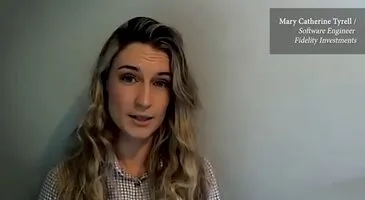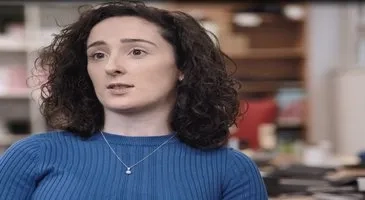Profiles
#GradStories Mary Catherine Tyrell, Software Engineer, Fidelity Investments
22 Jun 2023, 13:20

Mary Catherine Tyrell, who works as a software engineer with Fidelity Investments, talks to gradireland about her graduate career as a software engineer. Watch the video for advice and tips on what to expect in a career in this area and what skills you will need to succeed.
What does a typical day look like for you?
As a software engineer, you work in a very collaborative environment. On any given day I collaborate with project managers, systems analysts and other engineers as we design and develop new applications or improvements to existing applications. As a software engineer, you are responsible for the creation and testing of a piece of software, so I very often spend time researching practical solutions for a particular business requirement. I then write the code for those solutions, review the code supplied by my colleagues and generate automated test scripts to implement this code.
What skills do you need to be successful in your role?
As a software engineer you need to have an understanding of complex solutions and how to implement them. I think there is a misconception about software engineers that we work in isolation, with headphones on, generating lines and lines of code. In fact, that couldn't be further from the truth. When it comes to solutions, I'm working alongside other engineers on a daily basis. For a single line of code, there are considerable conversations about what that particular piece of code will bring to the application. So I think the ability to be able to communicate well with your colleagues and work as part of a team delivers a far better result in terms of the work that you do and what it delivers for the end user.
Where did you go to college and what did you study?
I followed quite an unconventional route to becoming a software engineer. I studied History and Sociology in UCD with the eventual aim of becoming a secondary school teacher. It became apparent to me quite soon that this wasn't something that would actually be fulfilling to me. I had developed a serious interest in technology. When I got a first-generation iPod Touch, I was fascinated by it. It was the first piece of technology that I owned that had elements like a graphical user interface and applications and icons. I became very interested in how and why it could do the things it did. However, in school, I didn't have any exposure to the world of computer science so I didn't consider it when it came to my CAO. So, at the end of my undergraduate degree, I decided I needed to take a brave step, and I applied for a Masters in Computer Science conversion course, also in UCD. This course equips non-computer science graduates with the skills that they need to work in the software industry.
What was your career break?
In my final semester on the conversion course I started looking at graduate programmes in earnest. Because I came from a non-computer science background I felt that I needed more knowledge and training in this area. So, when I began my research into graduate programmes I came across Fidelity Investments technology programme for graduates, it's called Leap. This programme was fantastic for me because it's a four-month training course that combines classroom learning with real-world projects from within Fidelity Investments. This was absolutely what I needed and after that, I was placed on a project team within the organisation where I have now been working for the past two years.
How have you found the transition to working from home?
Even prior to the pandemic, Fidelity Investments had fantastic opportunities in terms of flexible working or working remotely. My commute to work is actually 90 minutes every day so I was given the opportunity to work from home quite quickly during my time with the organisation and they gave us great support in making sure we could do that effectively. For me, it's a transition that I found very easy.
What do you love about your job?
We all see how fast technology moves and the incredible things that we can do with it these days. I am fortunate in that I am learning new things all the time and am constantly improving my skills. When it comes to new products or projects I very often spend time trialling new technologies to see if they will fit a solution that we are trying to implement. I often get to work with other technologies which gives me a great appreciation of the broader developments in the industry and what learnings we can take from what others have achieved.
gradireland editorial advice
This describes editorially independent and impartial content, which has been written and edited by the gradireland content team. Any external contributors featuring in the article are in line with our non-advertorial policy, by which we mean that we do not promote one organisation over another.

